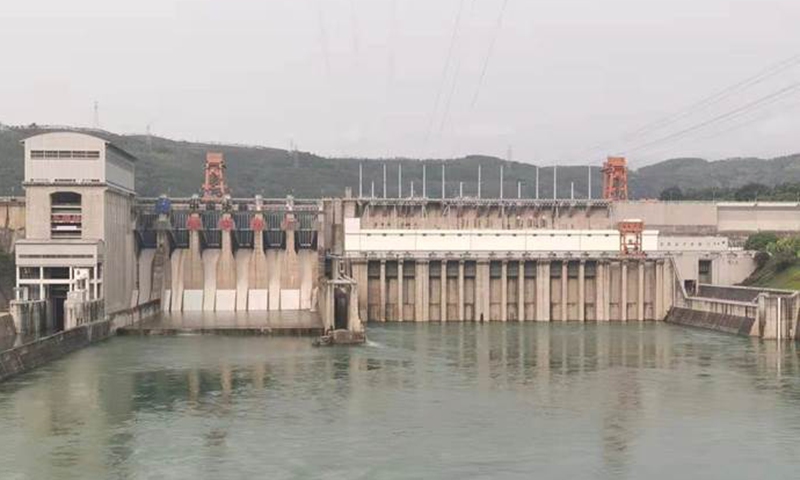Mekong countries’ diplomats call for more experience sharing in water governance upon in-person visits to China’s dams

Jinghong hydropower station located in Southwest China's Yunnan Province on Lancang River Photo: Hu Yuwei/GT
Mekong River countries' diplomats expressed that they value the scientific, regulatory effect of Chinese dams on water resources, following their latest in-person visits to the main hydropower stations along the Lancang River, recognizing China's role in bringing practical benefits to downstream sustainable development and calling for more experience sharing through Lancang-Mekong Cooperation (LMC).
After visiting the Nuozhadu and Jinghong hydropower stations, built on the Lancang River - upstream of the Mekong River that links six riparian countries - in Southwest China's Yunnan Province, from Monday to Thursday, envoys learned about the running techniques of Chinese-built dams and underlined the potential contribution of reservoirs to downstream communities in regulating flood and replenishing drought.
The visit, which was the core focus of the "2021 LMC Week on Water Resources" to celebrate the fifth anniversary of the LMC cooperation mechanism, raised the public's awareness of water resource co-development and improving mutual trust in cooperation.
Representatives recognized China's efforts to ensure downstream water demand during both dry seasons and floods as "a responsible upstream neighbor."
"In 2016, the Mekong River countries encountered the worst drought in 100 years. It was China's timely efforts to release dam water to the lower Mekong region that effectively alleviated the drought in the involved Mekong countries," said Htun Htun Oo, second secretary from the Embassy of Myanmar in Beijing.
"This [chance] allowed us to see relevant areas with our own eyes, get information with our own ears and be able to learn with an open mind," said Mongkol Visitstump, Consul-General of Thailand in Kunming.
Mongkol Visitstump gave his appreciation to China for its "great role in contributing the MLC Special Fund to executing more than 500 development projects," including elevating cooperation on water and the willingness to share year-round data from the Lancang-Mekong rivers to all members.
Both the Cambodian and Laos envoys told the Global Times that the visits changed their perception of the upstream hydropower projects and denied and refuted the claims that the Chinese dam caused drought downstream that have continuously been hyped up by some Western media outlets.
"We have been concerned about the building of dams. But when we saw the real thing that they have done, I felt it is very good. They give this nature in good condition. It looks very safe. It's a good experience that I have seen by my eyes today," Thongsavanh Phyathep, Minister Counselor of the Laos Embassy in Beijing, told the Global Times after his visits to two hydropower stations.
Envoys were also impressed by the good practice of the dam developer's taking care of the surrounding environment and sustainable ecology after they visited a vibrant resettlement village, a fish breeding station and an animal rescue station along with the Nuozhadu hydropower station, which were all part of the local government's effort to maintain biological diversity.
The event, co-hosted by the LMC Water Center and Huaneng Lancang River Hydropower Inc., attracted more than 50 representatives, including officials from China's ministries of water resources and foreign affairs as well as diplomatic envoys of the Mekong countries to China.
"Over the past five years, ministries of water resources and foreign affairs of the six Lancang-Mekong countries have treated each other with candor and sincerity, joined hands in water resources management, and responded to water challenges in the river basin," said Dr. Zhong Yong, Head of the Joint Working Group on Water Resources Cooperation of LMC from China, stressing that the LMC water cooperation has been elevated to a higher level and achieved remarkable progress.
Specifically, the cooperation mechanism has seen nearly 60 technical exchange activities and helped train more than 100 young talents, who majored in water resources, from the Mekong countries over the past five years, said Zhong, also Consul of the Department of International Cooperation, Science and Technology, Ministry of Water Resources of China.
The new projects are financed under the MLC Special Fund, which has produced many tangible benefits in enhancing the livelihood and well-being of Cambodian citizens. Among these projects, Cambodia has benefited from 55 projects in rural development, community business creation, water resources, agriculture, education and cultural heritage, said Sreng Sataro, Minister Counsellor of the Royal Embassy of Cambodia in Beijing.
The six Lancang-Mekong countries have a strong desire to further deepen practical cooperation in water resources as the cooperation has entered a fast lane, envoys expressed.

